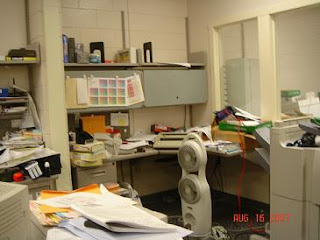- LEVERAGE - What or who can I leverage to make change occur in a more effective and efficient manner?
- INFLUENCE - How do I influence these leverage points to create the necessary catalyst for effective change in the system?
I'm finding that in some of my more difficult schools and districts, it is actually finding the leverage points. I've finally conceptualized the full meaning of leverage - I visualize it as a light swtch or the old stick shift in my '68 VW bug. I remember back to high school science when we studied the simple machines. A lever is a machine that makes work easier and more powerful. Since there are so many factors and the work could be endless in many schools, it is critical to find those switches that are going to make the work more manageable. So a question that came to mind as I was in the shower this morning is this...How do we find the leverage points in a school building or system if none are obvious? And I guess there would be a follow-up question...Is it possible to be in a school or district where there are NO leverage points? As I am mentally and verbally processing my way through this question, I'm very quickly coming to the answer to my own question. Of course, there can be schools that are so dysfunctional that there are no leverage points. As I continue to puzzle over this, I then begin to see our job as beginning at the beginning. Do we then begin to work on developing those levers?
The question for the funders of such programs (because they all cost money) and for researchers is how do they see this happening? Just how far do we go? Can we make that kind of impact from the outside? Many secondary schools in our country are in tremendous difficulty. They are holding their doors shut with shoe strings (literally) and moving hundreds of kids so slowly through metal detectors that 2nd hour in all practicality is the first hour of the day.
Related to leverage, is the idea of influence. As a professional developer and instructional coach my job is to begin to influence what is happening instructionally in a school. Although I have not yet read The Influencer by Kerry Patterson, et. al., I am very hopeful to gain insight into these questions. I hope that my next post will have some reflections and insights to this dilemma. In the mean time, I would love to hear your reactions to what I'm thinking. Those of you who have worked in school reform efforts, how have you processed your way through all of this? I'm on my much needed Christmas Break for the next few weeks, and besides enjoying my family and friends, I plan to ponder these ideas and read this book that is the subject of a book study group this month and next.
ON ANOTHER NOTE...Merry Christmas, Happy Holidays, and Happy New Year to all of my friends and colleagues. I so appreciate the opportunity to learn and grow with you. May you have some time to enjoy relaxation and regeneration for a few short weeks as we move into a very exciting and change-filled new year. Blessings to all of you.

 When in an airport last week, I saw a book entitled A Sense of Urgency. It is John Kotter's newest publication. I knew of Kotter's change process, which he wrote about in the 1990's targeted more for the business world. Educational leaders have been reading and talking about much that is written about leadership and change from the business sector and trying to apply it to the educational realm. Since urgency is such an issue in the public schools that I deal with day in and day out, I wanted to know more about it. I certainly know what it feels like. I believe (especially after reading the book) that I feel this sense of urgency. It feels focused and relentless - always seeking to focus on what needs to be changed given the school I am in. What I really liked about the book is that it describes three states of being related to this idea of change and describes what each one
When in an airport last week, I saw a book entitled A Sense of Urgency. It is John Kotter's newest publication. I knew of Kotter's change process, which he wrote about in the 1990's targeted more for the business world. Educational leaders have been reading and talking about much that is written about leadership and change from the business sector and trying to apply it to the educational realm. Since urgency is such an issue in the public schools that I deal with day in and day out, I wanted to know more about it. I certainly know what it feels like. I believe (especially after reading the book) that I feel this sense of urgency. It feels focused and relentless - always seeking to focus on what needs to be changed given the school I am in. What I really liked about the book is that it describes three states of being related to this idea of change and describes what each one 









